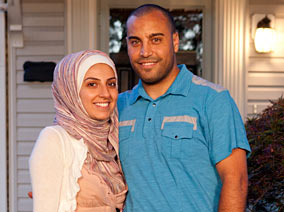Why Atheists Should Fight Anti-Muslim Bigotry

Last month, the TLC television channel premiered All-American Muslim, a reality show which follows several, from what I can see, fairly normal American families who happen to be Muslims. On any other planet this shouldn’t have been in any way controversial – but the Florida Family Association, a Christian-right hate group, has been pressuring advertisers to drop their support on the astounding basis that the stars of the show are too normal:
The Learning Channel’s new show All-American Muslim is propaganda clearly designed to counter legitimate and present-day concerns about many Muslims who are advancing Islamic fundamentalism and Sharia law. The show profiles only Muslims that appear to be ordinary folks while excluding many Islamic believers whose agenda poses a clear and present danger to liberties and traditional values that the majority of Americans cherish.
…Clearly this program is attempting to manipulate Americans into ignoring the threat of jihad and to influence them to believe that being concerned about the jihad threat would somehow victimize these nice people in this show. (source)
Remarkably, the FFA succeeded in convincing several companies to pull their ads, including the home-improvement retailer Lowe’s, a decision that’s sparked a media outcry. Amanda Marcotte of Pandagon writes that this is a story atheists should pay more attention to, and I agree.
I haven’t watched this show myself, so I have no idea whether it’s good or bad, intelligent or trashy. (For what it’s worth, Michelle Goldberg thought it was relatively boring.) But that doesn’t matter. What matters is the principle: in a free society, every group has the right to participate in public life. But Christianists like this group want to stifle that right through fear and intimidation, forcing all religious minorities back into the closet.
It’s remarkable how they don’t even try to hide the bigotry driving their efforts. Their argument is essentially, “We want everyone to believe that Muslims are all bad people, and if there’s a TV show which depicts Muslims as good people, it might undermine that belief.” In the eyes of the Christian right, only negative, villainous depictions of worldviews they disagree with are permitted. The same is true with gay people in the media, although they’ve pretty much lost that battle.
This is something that atheists ought to take a strong stand against, because this same prejudice can just as easily be turned against us. If some TV channel wanted to put on a reality show about atheist families living in the Bible Belt, showing the challenges nonbelievers face trying to get by in a majority-Christian society, how long do you think it would be before bigot groups like this one were demanding it be pulled from the air? (Actually, that sounds like a great idea for a TV show. I would definitely watch that. Networks, take note!)
We should support Muslims’ right to be part of public life for the same reason we should support gay and lesbian couples’ right to get married, and for the same reason we should support women’s rights to buy contraception or have an abortion: because we understand what it’s like to be the target of theocratic assaults on liberty from the Christian right, and because by defeating them on one front, we weaken them on all fronts.
On a purely selfish tactical level, defending Muslim groups can advance our own cause as well. As Amanda says, one of the most common steps toward leaving religion is making people aware of how many different belief systems there are, and how, for the most part, it’s pure chance that governs which one a person grows up believing. I would add one more reason: because it’s good for secularism to have as many different competing sects as possible. Defending church-state separation is an uphill battle when there’s one majority religion whose members don’t see what the problem is with government favoritism toward their beliefs. When there are multiple religions, each one with its own public presence and competing demands for recognition, it becomes much easier to make the case for neutrality.
And who knows? This show might even improve our standing abroad. Whether it’s loved or hated, American pop culture has enormous influence in other countries, sometimes more than it has here. And it can only benefit our image in the world, especially among the new democracies emerging in the Middle East, to show that America isn’t solely a Christian nation inhabited by crusading evangelicals. I hardly think that one silly cable TV show is going to bring about a global rapprochement, of course, but every little bit helps.
Ironically, the furor sparked by the Christianists’ boycott campaign has only succeeded in ensuring that this show becomes far more popular and widely discussed than it otherwise would have been. There’s a lesson here for would-be censors, as well as for cowardly companies like Lowe’s, now facing a massive consumer backlash of its own, as it should. The outcry against Christian bigotry is encouraging, but it can be bigger if atheists are willing to flex our muscles and contribute to it.
Image credit: TLC




